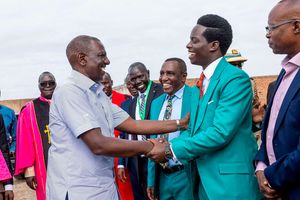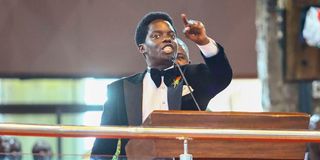
Kasmuel McOure speaks during public participation proceedings on the proposed impeachment of Rigathi Gachagua at Bomas of Kenya, Nairobi on October 4, 2024.
He was out on the streets dressed in a suit as others showed up in casual wear, defiantly lifting a teargas canister while shouting. Or speaking on a megaphone.
When he spoke, there was an unmissable defiance and a marked eloquence that packed a punch and authority.
Early viral photos and videos of him in the anti-government protests that began in June last year had everyone asking, “Who is this?”
“McOure? Kasmuel? What sort of name is that?” many wondered when they learnt what he was called. What was not in doubt, however, was that a new celebrity was being minted.
Kasmuel himself reckons that 2024 is the year he was “presented officially to the nation.”
Initially attending protests on a “let’s see what happens” basis, Kasmuel somehow found himself the centre of attraction, with new followers clinging to his every word.
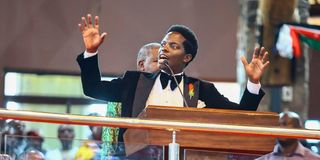
Kasmuel McOure speaks during public participation proceedings on the proposed impeachment of Rigathi Gachagua at Bomas of Kenya, Nairobi on October 4, 2024.
On social media platform X, followers swarmed him like bees. However, the same online community that worshipped him served him what he had never been prepared for—being “cancelled”, which means being banished online.
He is a man who has seen the bright and the darkest sides of the internet over the past one year.
When we ask him to introduce himself, he says: “I am many things. I am a pianist, I am a musician, I have been a teacher, I make suits, but currently I am mostly known for being a youth leader at the Orange Democratic Movement at the Youth League.”
Kasmuel’s journey traces back to a place called Zakayos in Nakuru, where he lived in his early years.
“It is funny because the current President is nicknamed Zakayo,” he says.
One of his first acts of defiance came when he was a primary school pupil in Nakuru, where he organised his classmates to protest against a teacher who was extending prep hours. This act earned him both reprimand and admiration.
Student leadership and activism
Later, in high school and university, Kasmuel found his voice in student leadership and activism. At the Technical University of Kenya, here he was a student leader, the leader in him was being forged even as he sought to establish himself in music.
“Before people know me as a political voice, I mostly was an artist and a musician. So, I was composing, I was leading bands, I was leading orchestras. I’ve taught [at some] international schools in this country. I’ve taught public schools. I’ve volunteered in churches. I’ve had orchestras, bands, and choirs of my own. So, I was mostly in the art space,” he says.
Kasmuel’s activism began at a local level but quickly escalated into national attention during the Covid-19 pandemic in 2021. Leading the “Fungua Nchi” campaign, he rallied hospitality and entertainment workers to oppose the government’s restrictive measures, marking his entry into public consciousness.
“So, we went to the streets and said ‘Fungua Nchi.’ And people ridiculed us but we did interviews, we did protests, the whole shebang. And then, went on telly, at the time, the media was very biased… they’re asking, so what are you trying to achieve? What’s your angle?” he said in a recent interview.
In early 2024, Kasmuel was involved in the “End Femicide” protests in Nairobi.
Come June, he was sold to the calls to show up on the streets and raise opposition towards the Finance Bill. A few days earlier, he had had a sad episode in his life that almost ended in death by suicide, and a friend brought up the idea of the protest because it “could give him life”.
And he decided to show up, dressed “as an old professor”.
“I wear suits normally, but this was rather baggy,” he says.
It is on that first day that he grabbed one canister that has been thrown their way. Photos captured of him lifting it up as he shouted became a hit.
“Oh, this is the teargas guy,” he could hear people saying.
Through various coincidences, he emerged as one of the leading voices against the Finance Bill 2024. In one instance, he felt the protesters’ chants were “really lame” where he was.
“I was like, ‘Let me teach you songs to sing at a maandamano,’” he says.
Some cameras were directed his way as he led the singing, and he remembers doing several media interviews on the streets.
This newfound visibility came with increasing risks. Reports of harassment and surveillance by authorities began to surface.
On the day after the June 18 protest, he recalls, his car was trailed by a police car at the Kilimani branch of the Quickmart Supermarket. He met a man who trailed him into the supermarket alongside two others who were armed.
“When I go outside, there’s a whole police lorry over there,” he recalls.
This was the time when his popularity was soaring.
Accused of being a government spy
By the fourth week of June 2025, he was having 135,000 followers on X, a platform he insists on calling Twitter even with its rebrand. They came in a flurry from June 2024 onwards when he had about 400 followers. With the sudden attention, he felt challenged to start using the platform he had initially considered a place for “smart people”.
“Twitter for me was dead because I used to just follow Stem (science, technology, engineering and mathematics) things,” he says. “I started just writing, typing out things and sharing out posters, amplifying voices of what’s happening, like sharing out things.”
However, the crash was soon to come, and it started with an arrest on the day protesters stormed Parliament then released two days later. Looking back, he thinks he should have communicated his abduction and online absence better. Within no time, allegations started flying that he had abducted himself.
After being released and getting back online, he was shocked by the sentiment.
“I was seeing people starting to troll me online and saying, ‘This man staged his own abduction and those kinds of things. And was like, yeah, I could have communicated better,” he says.
June 27, 2024, he recalls, is the first time he was “cancelled”.
“Everyone was so mad about it… All sorts of expletives. And it was heartbreaking. That’s the first time I got cancelled. And from then, people just started trolling me. They were saying, ‘Oh, man, we don’t even know this guy’s history,’” he says.
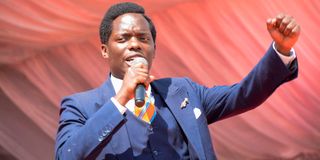
Kasmuel McOure speaks at Bukiri Primary School, Funyula, Busia County, on February 28, 2025, as the Orange Democratic Movement celebrated 20 years in Kenya's political landscape.
Then the allegations started flying that he was a government spy or someone being funded by foreign entities.
“There was a lot of propaganda, people saying that I was a government agent, I’d been sponsored, I was an NIS plant,” he says.
A photo of that showed a lady behind him holding a queer flag – taken in the “End Femicide” protest earlier in the year – sparked further backlash, with detractors accusing him of spreading agendas beyond the scope of his protests.
Kasmuel didn’t know it yet, but an incident in Nairobi where he clashed with a doctor volunteering at a medical camp would end on a sour note. A video of their altercation painted him as dismissive and arrogant, despite his insistence that he had been advocating for better treatment of protesters.
This incident served as a catalyst for widespread criticism, both online and within activist circles. That day, he even faced opposition while on the streets.
“I was getting cancelled every two weeks. And it’s very tiresome when you’re being bullied at a national scale,” he says. “I wasn’t a politician before. I was a musician. And you don’t get bullied as a musician.”
Things came to a head on July 7, or Saba Saba, during a planned performance at Uhuru Park in Nairobi. His attempts to cheer up the crowd were met with boos and expletives.
Trolled, bullied and threatened
“It was super crazy. And I went home feeling rejected,” he says. “Embarrassed, I called my woman and I told her, ‘Man, it’s super crazy. I’m feeling really small.”
“That really, really broke me. It opened a new can of warms of trolling and just the bullying and threats. And I lost very many friends,” he says.
Come August, the planned Nane Nane protests hardly happened because police were vicious in their bid to prevent gatherings.
“People didn’t show up,” he recalls. “After that protest, I was so heartbroken because on July 7, everyone kept on asking us, ‘’What next?’”
It was during this period that he reached out to various personalities for advice.
“There are people who were very instrumental in giving me information and just encouraging me, some who I may not have seen eye to eye with, but I truly acknowledge the work that they did. Nelson Havi gave me a book about Che [Guevara], and he said, ‘You must not let this die.’ And he really, really imbued me with the constitutional framework. He gave me a crash course on the Constitution,” he says.
He also mentions Kinuthia wa Ndungu and Joshua Okayo as some of the other people he interacted with.
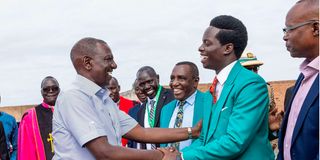
President William Ruto shares light moments with Kasmuel McOure during the opening of a new church sanctuary at AIC Kipkorgot in Uasin Gishu County on December 22, 2024.
“I interacted with so many people, politicians, people like Babu Owino, people like Zack Kinuthia, who were very interested in helping me even just develop,” says Kasmuel.
After August 8, 2024, he decided he would not take part in another protest “whose agenda I don’t know, which I am not at the core of organising”.
“I’m no longer attending protests. And I’m no longer leading anyone,” he says. “Now I’m retreating to focus on change the way that people want it. Because you must believe the people to be their own liberators. You must want the change. You can’t impose that change on them. They must want it equally.”
So, how did he get himself in the Orange Democratic Movement, a party that is in the broad-based arrangement with President Willam Ruto’s Kenya Kwanza Alliance? He says he chose the party leader, Raila Odinga, over others.
“A lot of these politicians had been hunting for me. And the most interesting one, the one I ended up choosing, was Honourable Raila Odinga,” he says.


